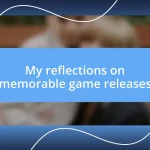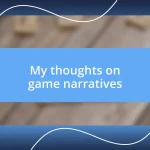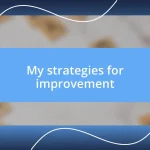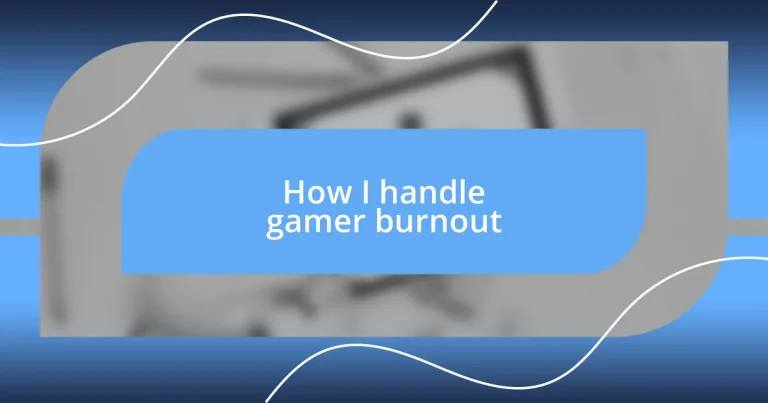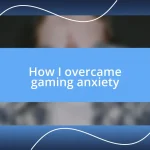Key takeaways:
- Gamer burnout is a subtle yet impactful phenomenon characterized by signs like lack of motivation, fatigue, and emotional detachment from games.
- Effective recovery strategies include taking intentional breaks, setting boundaries around gaming time, and engaging with gaming communities to reignite passion.
- Maintaining a balanced schedule and being mindful of gaming habits are essential for long-term enjoyment and preventing burnout.
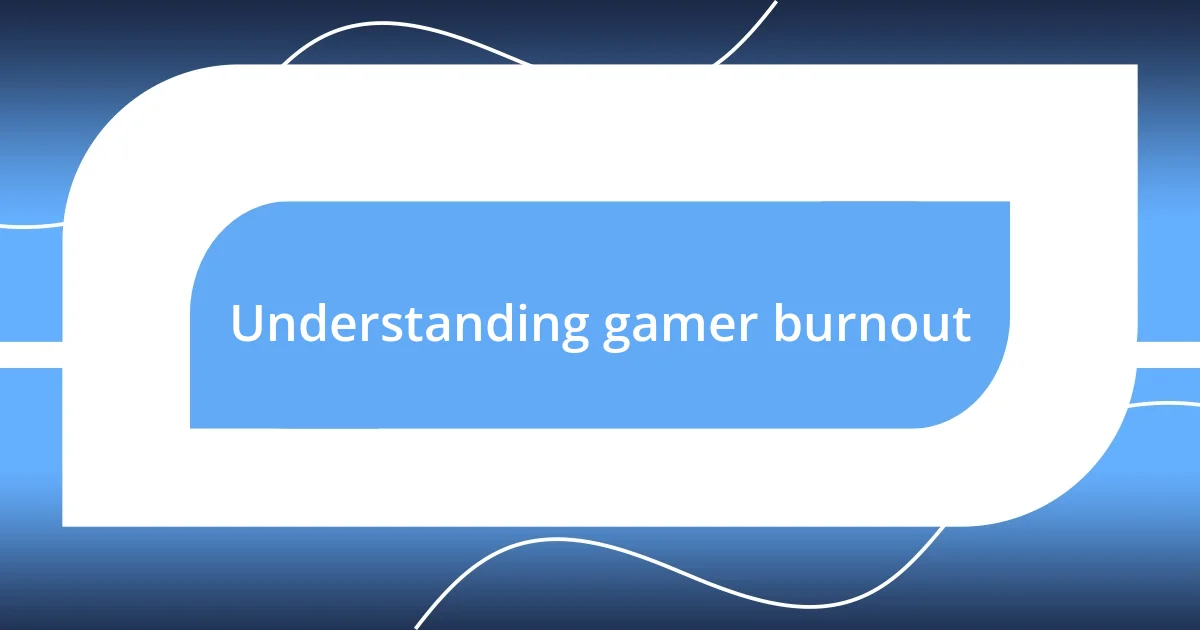
Understanding gamer burnout
Gamer burnout is a challenging phenomenon that I’ve encountered more often than I’d like to admit. It creeps in quietly, often disguised as a struggle to pick up the controller or a sudden disinterest in games I once loved. Have you ever logged into your favorite game only to feel a wave of fatigue wash over you, as if the excitement just drained from your spirit?
What I’ve learned is that burnout often stems from the pressure to perform or keep up with the latest trends. I remember when I felt overwhelmed by a backlog of games and online events that I “had” to participate in. The thrill of gaming turned into a chore, and I found myself scrolling through social media instead. It’s a stark realization, isn’t it? When something you once enjoyed transforms into a source of stress, it’s time to pause and reflect.
It’s crucial to recognize the signs of burnout before it spirals out of control. I’ve experienced nights where I’d sink into a game but felt utterly detached, as if my mind was miles away. That disconnect was my body’s way of telling me to step back. Understanding these feelings and acknowledging them is the first step in preventing burnout and reclaiming the joy of gaming. How about you? Have you felt that same emotional detachment from your games?
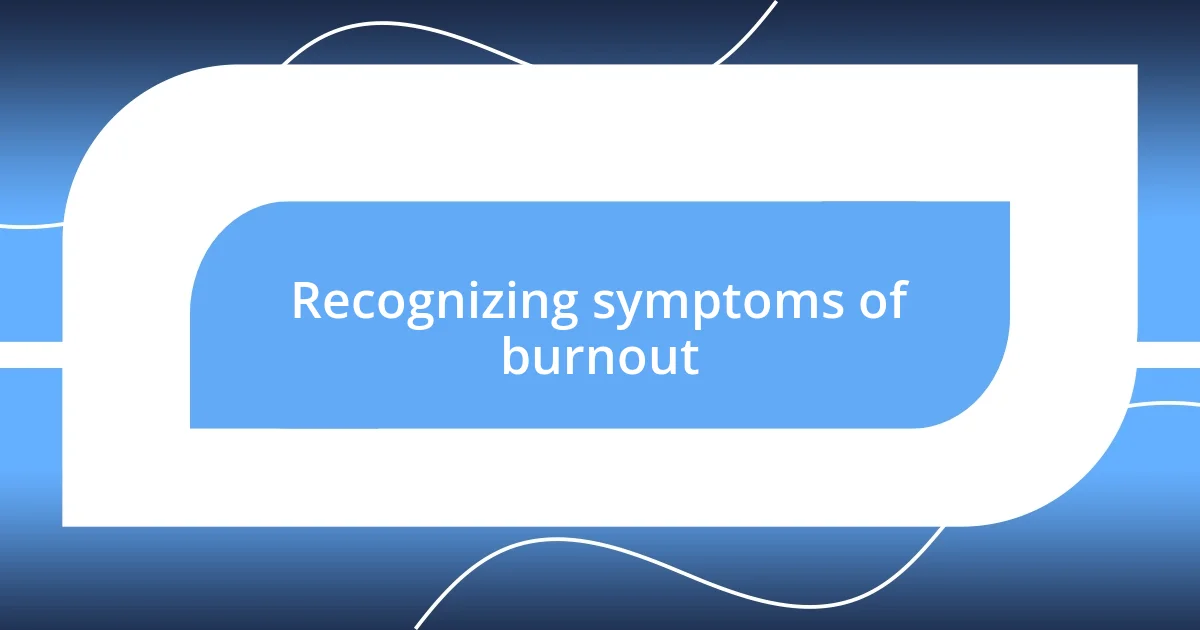
Recognizing symptoms of burnout
Recognizing the symptoms of burnout in gaming can feel quite personal. I vividly recall a time when I stared at my favorite RPG, ready to play, yet my excitement was replaced by a heavy sense of dread. The allure of exploration and epic battles vanished, and instead, I felt almost numb. These moments can be alarming yet they offer important clues about what we’re experiencing.
Here are some common symptoms of gamer burnout to watch for:
- Lack of Motivation: You find yourself struggling to start or even enjoy your games.
- Fatigue: Gaming feels exhausting rather than exhilarating.
- Increased Frustration: Small challenges in games that once made you eager to conquer now create overwhelming irritation.
- Withdrawal: You start choosing social media or other activities over gaming without hesitation.
- Emotional Detachment: You’re physically playing but mentally checked out, as if you’re a spectator in your own gaming experience.
I remember feeling all of these symptoms at once like a heavy weight on my chest, and it taught me that acknowledging them is essential to starting my journey back to enjoying gaming. Understanding these signs can empower you to make changes before burnout takes hold.
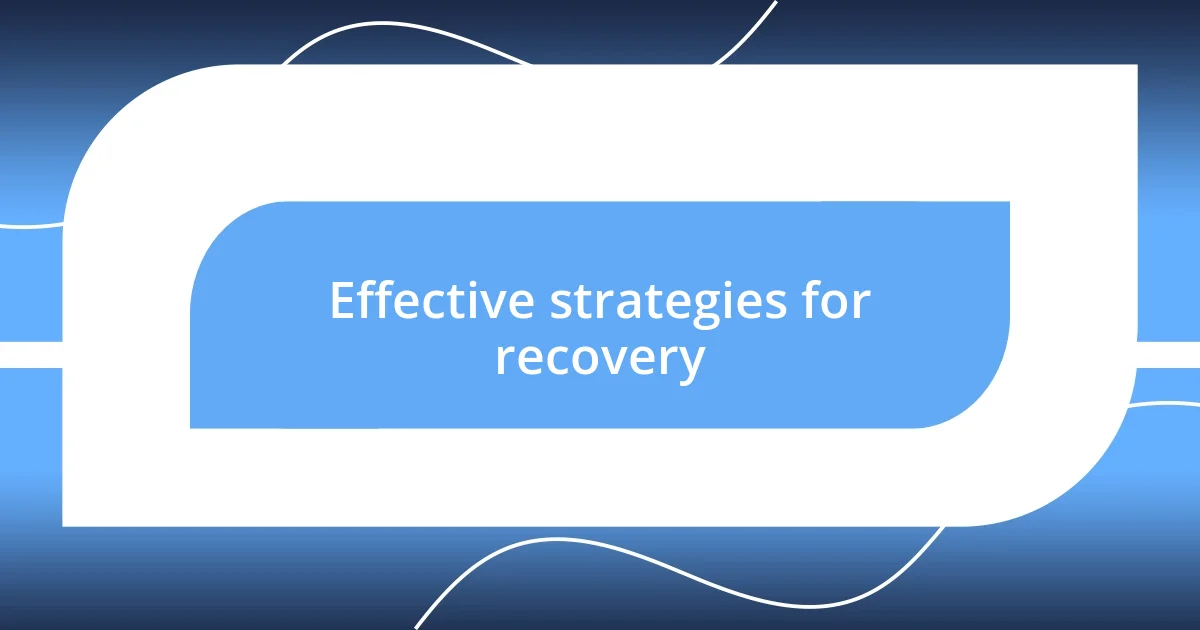
Effective strategies for recovery
Effective strategies for recovery can be a real game-changer when you’re up against burnout. One of my favorite techniques is taking intentional breaks. I recall a stretch where I decided to unplug entirely on weekends. Instead of gaming, I explored new hobbies like hiking and reading, which surprisingly recharged my mental batteries. When I returned to gaming, it felt fresh and exhilarating again. Have you ever tried stepping away from your screen to reconnect with the world?
Another strategy that I’ve found helpful involves setting boundaries around my gaming time. I used to dive into marathon sessions, thinking more was better. However, I’ve learned that limiting my gameplay to a few hours a day – and making sure to incorporate offline activities – can foster a healthier relationship with gaming. It’s about rediscovering balance, and for me, that has meant planning fun outings with friends instead of mindlessly grinding levels solo.
Lastly, I’ve found it beneficial to cultivate a gaming community. Sharing experiences, thoughts, and even frustrations with fellow gamers can relieve pressure. Recently, I joined a gaming Discord. Engaging in conversations about shared interests and swapping game recommendations reignited my passion. Can you think of a time when discussing a game with someone brought back your enthusiasm? It’s powerful how connecting with others can help bring the joy of gaming back to life.
| Strategy | Description |
|---|---|
| Take Breaks | Unplugging for a while to explore other interests recharges mental energy. |
| Set Boundaries | Limiting gaming sessions to allow for balance in life cultivates a healthier relationship. |
| Engage with Community | Connecting with fellow gamers restores enthusiasm and provides support. |
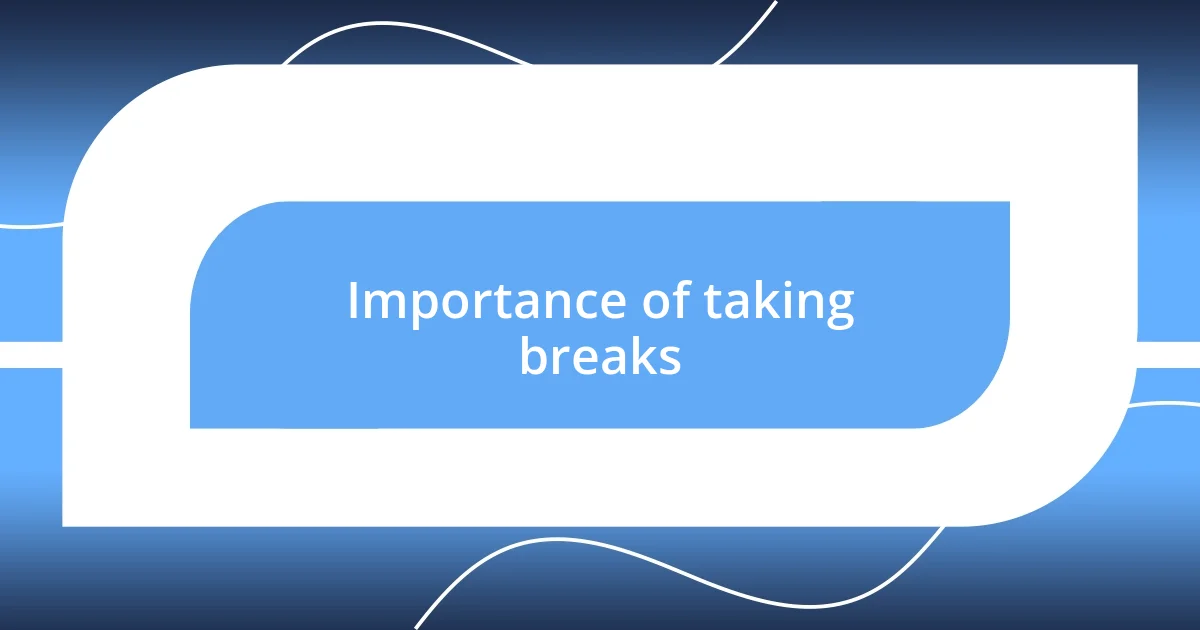
Importance of taking breaks
Taking breaks is essential for maintaining enthusiasm and preventing burnout. I’ve experienced those moments when I felt completely overwhelmed by the games I used to adore. It was during one of those times that I decided to put down the controller and step outside for a short walk. I realized how refreshing it was to breathe in the fresh air and clear my mind. Have you ever felt that sudden wave of clarity after taking a short break?
Moreover, I’ve learned that the benefits of breaks extend beyond just physical rest. They provide mental space to regain perspective on gaming and life. Even a brief pause can allow for reflection on what I truly enjoy about gaming. I remember a couple of times when I returned to my console after a few days off, and it felt like rediscovering an old friend. I approached my favorite games with renewed passion, as if I was experiencing them for the first time again.
Lastly, breaks can foster creativity in how I engage with games. One day, while taking time off, I developed a new idea for a character build that ended up being one of the most fun experiences I’ve had. It reminded me that stepping away isn’t a loss; it’s an opportunity to come back even stronger and more inspired. How have breaks reshaped your gaming experience? Taking that step back can make all the difference.
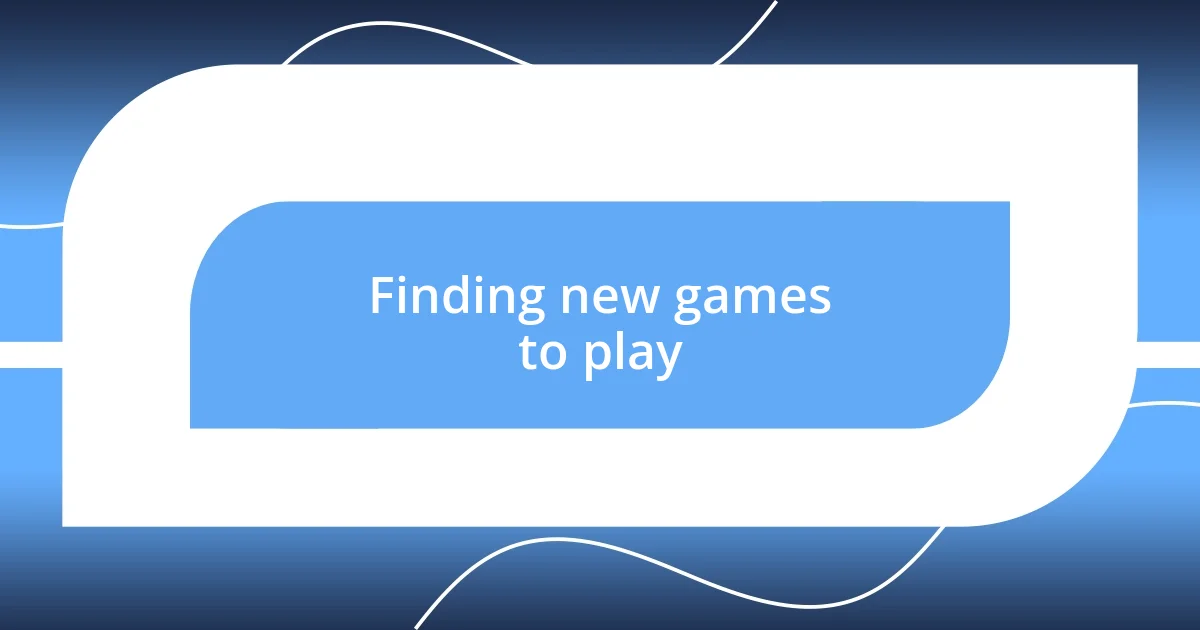
Finding new games to play
Finding new games can be a thrilling way to rekindle excitement during a burnout phase. I remember a time when I felt completely drained, and I decided to peruse recommendations from friends and online communities. One particularly exciting find was an indie game that had been overlooked; diving into its unique world felt like discovering a hidden gem. Have you ever stumbled upon a game that took you completely by surprise?
Another approach I’ve enjoyed is exploring different genres. Switching from high-octane shooters to cozy simulation games was a revelation for me. I found myself completely immersed in the tranquil rhythm of cultivating a virtual garden, offering a refreshing change of pace that reawakened my joy for gaming. Sometimes, stepping into an entirely different realm can bring new energy and perspectives. What’s the last genre you tried that opened your eyes?
Lastly, keeping an eye on upcoming releases has become a delightful hobby. I often look for trailers or developer livestreams, which can really build excitement. I vividly recall the anticipation I felt for a recent RPG launch, and when it finally dropped, the thrill of diving in felt indescribable. It’s like gearing up for an adventure, and that sense of expectation alone can reignite my passion for gaming. What upcoming title are you most excited about? It’s all about finding that spark that reignites your gaming journey.
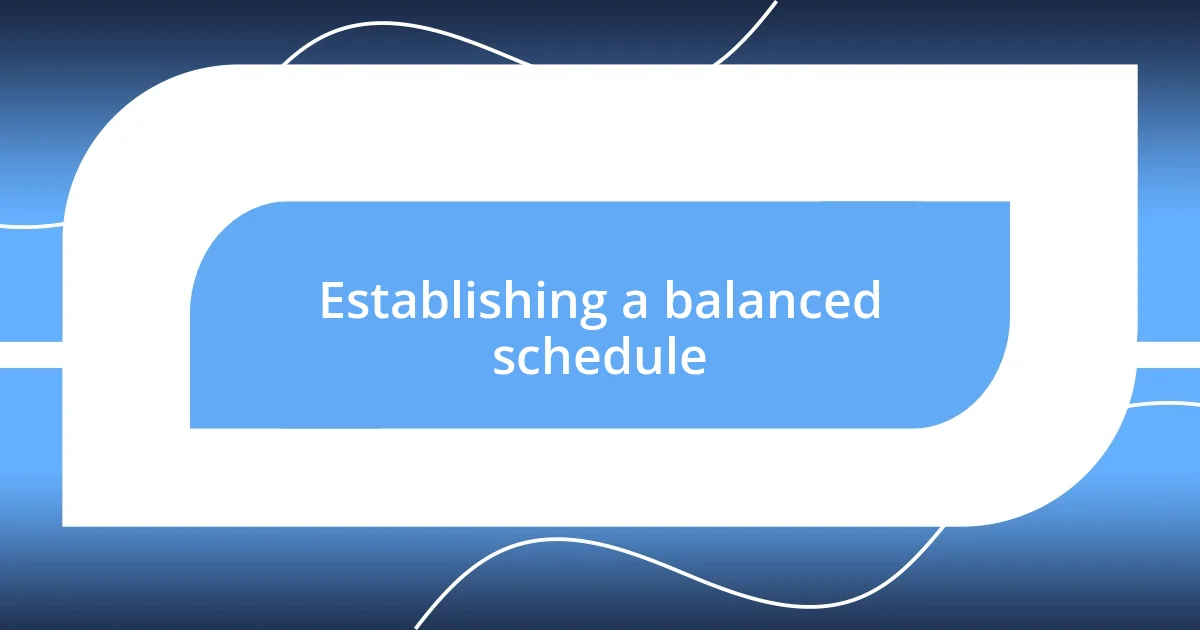
Establishing a balanced schedule
Establishing a balanced schedule is crucial for preserving my gaming passion. I remember a time when I was sucked into a whirlwind of daily gaming marathons, and it felt exhilarating at first. But before long, I noticed I was neglecting other activities that I used to love. Have you ever found yourself skipping meals or forgetting about that book you’ve wanted to read because you’re too engrossed in a game? It’s all too easy to lose track of time.
Now, I prioritize creating a daily gaming routine that fits into my life seamlessly. By setting specific times for gaming, work, and personal activities, I feel more in control. For example, I’ll enjoy my favorite sessions in the evenings, reserving my mornings for exercise and errands. This way, I not only enjoy my gaming sessions, but I also keep my energy levels high throughout the day. It truly is rewarding to see how balance cultivates a healthier relationship with gaming.
I’ve also found that using a planner or digital calendar has been a game-changer. When I mark out my gaming sessions alongside social events or even study time, I’ve noticed I’m less likely to suffer from that overwhelming sense of regret when I realize I’ve let gaming take over. Have you ever tried planning your gaming time? It helps me to treat gaming as a special part of my day rather than the only part, making each session feel like a treat rather than a chore.
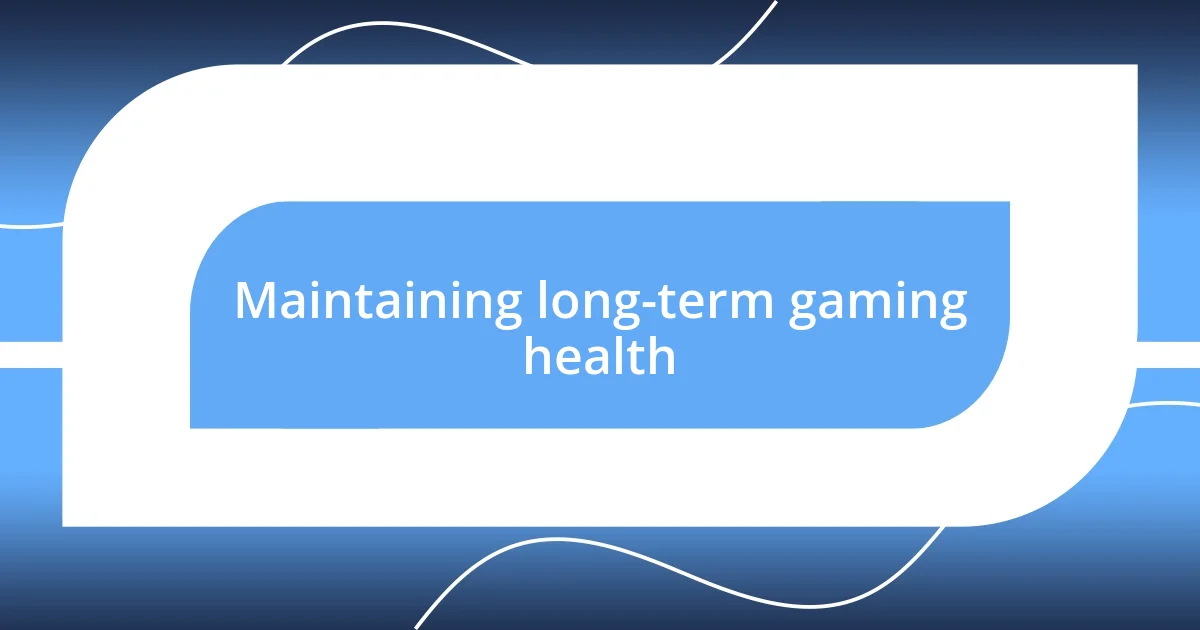
Maintaining long-term gaming health
Maintaining long-term gaming health is all about being mindful of my gaming habits. I used to get caught up in binge sessions that drained my energy, leaving me feeling more like a zombie than a gamer. Now, I consciously take breaks, stepping away from the screen to recharge. Have you ever paused a game just to stretch or grab a drink? I find that those moments not only refresh my mind but also let me savor the game more.
In addition, I make it a point to engage in gaming discussions and communities regularly. Connecting with fellow gamers often reignites my enthusiasm. I remember sharing my thoughts about a recent title on a forum and realizing how much I missed that interaction. It struck me that gaming isn’t solely about solo play; the conversations and shared experiences can enhance the joy tremendously. What’s the last gaming discussion that got you excited?
Adopting a holistic approach to gaming health has transformed my experience. I’ve begun incorporating physical activities like yoga or walks into my routine, which helps counterbalance the couch time. It’s surprising how a bit of movement can lift my spirits and improve my focus during gaming. Have you ever noticed that stepping away for a little exercise made you come back to the game with a fresh perspective? It’s all about creating a healthy balance that allows my passion for gaming to thrive without burning out.
